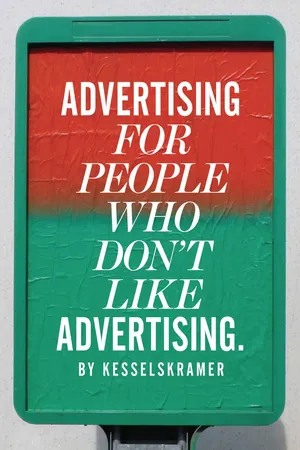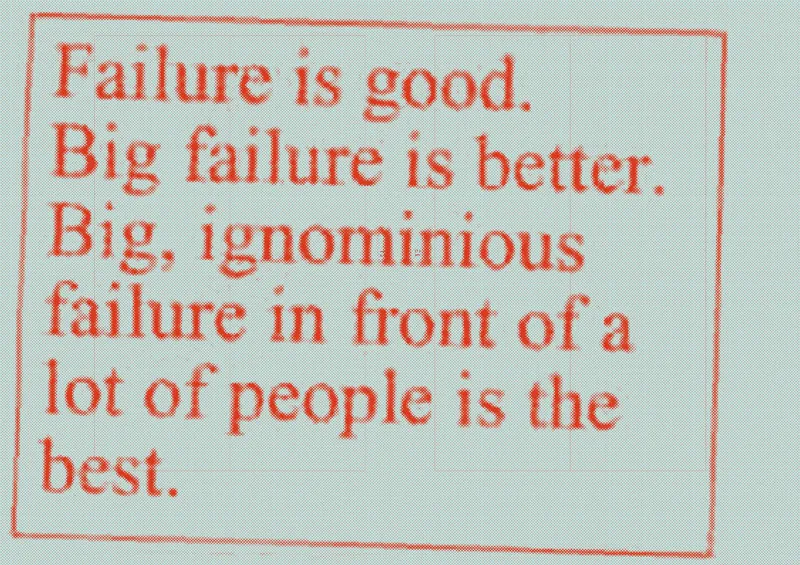![]()
MARK FENSKE
ON TEACHING ADVERTISING LIKE ARISTOTLE.
Mark Fenske has been a creative at Young & Rubicam, and at Wieden + Kennedy, Portland. He started his own music video production/ ad agency hybrid called The Bomb Factory in L.A. There, he directed music videos for Van Halen, among others. Mark has won the MTV Video of the Year, Director of the Year, and is a member of the Screen Actors’ Guild. He’s also received every major advertising prize. Mark now teaches creative thinking at the Virginia Commonwealth University.
PLEASE DESCRIBE YOUR BACKGROUND.
“I am a Midwestern boy.
A Michigan-football-watching, deep-friedturkey-eating, flannel-shirt-is-a-coat man of the prairie.
A barn-sized door-filler from the offensive tackle-producing breadbasket of the country.
Things unrefined, unrecommended and unbeautiful arouse me, touch me with a kinsman’s embrace, and speak to me in a dialect unhearable to those who could watch the 1985 Chicago Bears’ Super Bowl Shuffle and remain tearless.
When I sit down to write, beer and sausage is what flows in my head.
I am uncommonly claustrophobic and I am a sinner in need of salvation.
In short, just like everyone else, maybe shy a couple of style points.”
GIVEN THAT THIS BOOK IS CALLED “ADVERTISING FOR PEOPLE WHO DON’T LIKE ADVERTISING,” WE’RE OBLIGED TO ASK: DO YOU LIKE ADVERTISING?
“Nobody asks astronauts if they like space. Or priests if they like God. But everyone asks advertising folks if we like advertising.
They say it the way you might ask a stripper if he or she likes stripping.
I like advertising. I’d rather be in advertising than be an astronaut.
Mostly because I saw The Right Stuff and am pretty sure I don’t have it.
But also because everything astronauts do stays in their head.
They see the Earth from space.
Which is cool.
But what do they do with that experience?
Now, if I could be an astronaut who gets a job as a copywriter after being on the moon.
That’d be some sweet action.
Ninety-eight percent of the advertising people see is crap.
No wonder they wonder why we like it. If they knew what the other 2% is like, and the power of it, and what it’s like to make it up out of nowhere, they’d like it like I do.”
WHAT ARE THE BITS YOU DON’T LIKE?
“Everything in life is both good and bad.
Awards, for example, often go to lookalike work rather than to ground-breaking leaps forward.
Which is bad.
But what does a better job than the awards shows of keeping track of who did what when?
Good and bad in everything.
At the present time something to hate about advertising is the deleterious effect on the quality of the work that the holding companies are having.”
HOW WOULD YOU CHANGE THOSE BITS FOR THE BETTER?
“Teach what good work is, show folks how to do it, and not ever accept anything less than good work from them and they will grow up to want good work.
You can’t argue with a holding company. You have to beat them.”
HOW WOULD YOU DEFINE A “GOOD IDEA”?
“I’m glad you asked this question because it gives me a chance to point at Milton Glaser.
I’ve never read a better explanation than that on page 7 of his book, Art is Work:
1. Work that goes beyond its functional intention and moves us in deep and mysterious ways we call great work.
2. Work that is conceived and executed with elegance and rigor we call good work.
3. Work that meets its intended need honestly and without pretense we call simply work.
4. Everything else, the sad and shoddy stuff of daily life, can come under the heading of bad work.”
A sketch from Fenske’s workbook, created during his time in L.A., where he ran production company/ad agency The Bomb Factory.
MORE GENERALLY, HOW WOULD YOU DEFINE CREATIVITY?
“I don’t think any of the general definitions help.
Making stuff up?
Of course.
But what’s interesting is to consider there’s nothing we can make up that didn’t exist to begin with.
Nothing that wasn’t made up before we got to it.”
WHAT EXAMPLES OF CREATIVE WORK REALLY STAND OUT?
“Buckminster Fuller’s geodesic dome.
Michelangelo’s David.
Oh, you mean ads.
I thought the Grrr spot for Honda in London was great.
And 1984.
They’re the equal of anything else on Earth.
But, at the same time, they’re not Bach, they’re not Twain, they’re not Rembrandt. Ads, as part of their format and intention, tie themselves to the ground.
Literature and music and painting fly.”
WHO ARE YOUR HEROES? (CAN BE AD PEOPLE OR PEOPLE IN GENERAL.)
“Abraham Lincoln, Martin Luther King, Walt Disney, Sandy Koufax, Emily Dickinson is a start. Ad guys: Hal Riney.”
WHAT ARE THE ATTITUDES THAT CREATIVES NEED TO SURVIVE?
“Selfishness.
Also, you can’t be afraid of being naïve. Because you can only find satisfaction in satisfying what your naïve heart wants.”
HOW WOULD YOU RATE THE QUALITY OF YOUNG CREATIVES LEAVING COLLEGE TODAY?
“They don’t read much, so I’m not sure where they’ve gotten it all from, but they’re smarter than I remember myself being at their age.
As ad folks, though, they’re more inclined toward measuring success according to the business side of things than I was, and more than I admire.
Maybe that’s their intelligence kicking in. I think advertising (the 2% that’s made right, at least) is the most powerful art form on Earth.
I fear the next group doesn’t see it that way and, as a result, may not value it enough to keep it powerful.”
HERE’S AN OLDIE: DO YOU BELIEVE CREATIVITY IS INNATE AND CAN BE DEVELOPED?
“I don’t know.
I do wonder, though.
I wonder if creativity might be like kissing. You’re born with an ability to pucker your lips and press them against another person’s.
You can add to your ability by practising. And you might develop a repertoire of tricks if you have experience with other kissers.
But.
What if you’re a genius kisser right out of the box? Then aren’t all the tricks you’ve added a perversion of your genius?
That’s only a rare problem.
But it is one, so it bears mentioning. The more common problem is that kissers tend to make other kissers kiss like they do. So what we think are new tricks and clever moves are in practice actually a kind of corralling of our natural free-form instincts that keeps us closer to the habits of the pack and steers us away from genuine invention.
Then there’s the matter of what constitutes joy.
Is it greater to kiss a tutored mouth or one lacking artifice?
I don’t see how it’s possible that every human being isn’t born with the creative impulse.
This is because I believe God created the world and made man to be like him. So us all having creativity is a given. When you ask whether it can be developed I think the answer is equally obvious.
Of course it can.
But, like kissing, it needs to be done by the person who owns it. In search of what he or she naïvely wants.”
Wisdom from a Mark Fenske workbook.
WHAT’S YOUR PERSONAL APPROACH TO TEACHING COMMERCIAL CREATIVITY?
“Yes, that’s the exact right practical question to follow the abstract philosophical question before it.
I believe we learn by doing.
Aristotle said this a long time ago and I’m proud to say I agree with him.
It is especially true in making art. Now, a person can argue whether advertising is art.
But to me that argument doesn’t matter here because, whether you consider the end product to be art or not, the person making it up has to approach it as an art form.
The impulse that starts a sculpture or a painting or a bridge or a song is there in the making of an ad because, like those other art forms, an ad is a thing constructed out of other things.
That one of the considerations which influences the shape of an ad is a concern for how it makes the audience feel about bathroom tile cleaner doesn’t mean the maker of the ad is released from the other obligations of an art form, such as it having to entertain, be beautiful, release joy in the viewer and whatever else art does.
So, to get better at an art form, how does one proceed?
Do it.
Do it without regard for what has been done before.
Do it by your own lights and what God has given you to bring you to the point you’re at.
Then.
When you’ve made something, stand there while other people look at it.
Drink in their disapproval.
Savour their jealousy when you do something right.
Feel.
That builds steel in your gut.
It might be steel that tells you don’t do _____ again.
Or it might be steel that tells you to, yes, walk down that dark hallway leading nowhere in your mind because last time you did so you found what other people wished they’d found.
That steel comes from you putting your work in front of people and eating the res...


